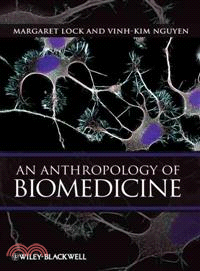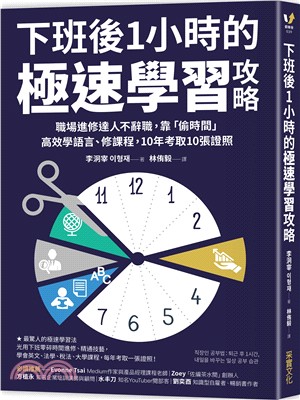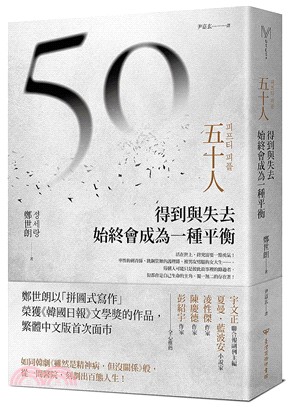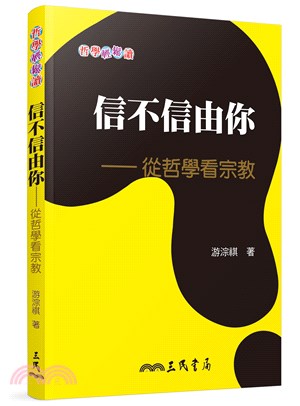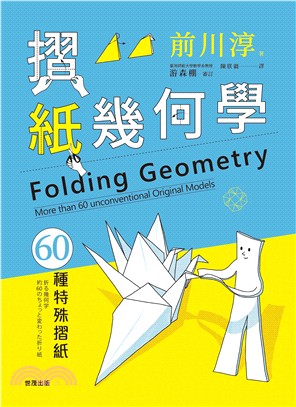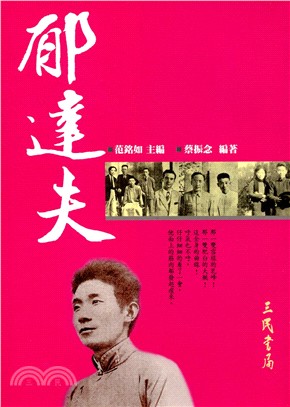AN ANTHROPOLOGY OF BIOMEDICINE
- ISBN13:9781405110723
- 出版社:JOHN WILEY & SONS;LTD
- 作者:LOCK
- 裝訂/頁數:精裝/520頁
- 規格:25.4cm*18.4cm*3.8cm (高/寬/厚)
- 出版日:2010/04/09
商品簡介
Introduces biomedicine from an anthropological perspective, exploring the entanglement of material bodies with history, environment, culture, and politics
Develops and integrates an original theory: that the human body in health and illness is not an ontological given but a moveable, malleable entity
Makes extensive use of historical and contemporary ethnographic materials around the globe to illustrate the importance of this methodological approach
Integrates key new research data with more classical material, covering the management of epidemics, famines, fertility and birth, by military doctors from colonial times on
Uses numerous case studies to illustrate concepts such as the global commodification of human bodies and body parts, modern forms of population, and the extension of biomedical technologies into domestic and intimate domains
Winner of the 2010 Prose Award for Archaeology and Anthropology
作者簡介
Vinh-Kim Nguyen is a physician and a medical anthropologist. He practices medicine in Montréal at the Clinique l'Actuel, which specializes in HIV and hepatitis, and the Emergency Department of the Jewish General Hospital, and teaches at the University of Montreal where he is an Associate Professor in Social Medicine. As a researcher, he is affiliated with both Global Health Unit of the Montreal University Hospitals' Research Centre and the Max Planck Institute for Social Anthropology in Halle, Germany. He was recently awarded the Aurora prize for his research by the Social Sciences and Humanities Research Council of Canada.
目次
Improving Global Health: the Challenge.
Biomedicine as Technology.
Does Culture Exist?
A Word about Ethnography.
Outline of Chapters.
Part I: Technologies and Bodies in Context.
Chapter 1: Biomedical Technologies in Practice.
Technological Mastery of the Natural World and Human Development.
Technology and Boundary Crossings.
Biomedicine as Technology: some Implications.
Technologies of Bodily Governance.
Technologies of the Self.
The power of biological reductionism.
Techno/Biologicals.
Chapter 2: The Normal Body.
Cholera in the Nineteenth Century.
Representing the Natural Order.
Truth to nature.
The natural body.
A numerical approach.
Other natures.
Interpreting the body.
How normal became possible.
When normal does not exist.
Problems with making normal.
Pathologizing the "normal".
Limitations to biomedical "objectivity".
Better than well?
Chapter 3: Anthropologies of Medicine.
The Body Social.
Contextualizing Medical Knowledge.
Medical Pluralism.
The Modernization of "Traditional" Medicine.
Medical Hybridization.
Biodiversity and Indigenous Medical Knowledge.
Self-Medication.
A Short History of Medicalization.
Opposition to Medicalization.
The Social Construction of Illness and Disease.
The Politics of Medicalization.
Beyond Medicalization?
In Pursuit of Health.
In Summary.
Chapter 4: Local Biologies and Human Difference.
The End of Menstruation.
Local biologies.
Rethinking Biology in the Midst of Life's Complexity.
Is Biology Real?
Kuru and Endo-Cannibalism.
Racism and Birth Weight.
Of Microbes and Humans.
Antibiotics and Resistant Microbes.
Debates about the Origin of HIV.
In summary.
Part II: The Biological Standard.
Chapter 5: The Right Population.
The Origins of Population as a "Problem".
Addressing the "problem" of population.
Improving the Stock of Nations.
Alternative Modernity and Indian Family Planning.
The One Child Policy.
Biomedical technology and sex selection.
Contextualizing sex selection: India and "family balancing".
Contextualizing sex selection: disappeared girls in China.
Sex selection in a global context.
Reproducing Nationalism.
Summary.
Chapter 6: Colonial Disease and Biological Commensurability.
An anthropological perspective on global biomedicine.
Biomedicine as a tool of Empire.
Acclimatization and racial difference.
Colonial epidemics: Microbial theories prove their worth.
Resistance to the biomedicalisation of epidemics.
Microbiology as a global standard.
Infertility and childbirth as critical events.
Birthing in the Belgian Congo.
A global practice of fertility control.
Intimate colonialism: the biomedicalization of domesticity.
Biomedicine, evangelism and consciousness.
The biological standardization of hunger.
The colonial discovery of malnutrition.
Albumin as surplus.
The biologization of salvation.
In Summary.
Chapter 7: Grounds for Comparison: Biology and Human Experiments.
The laboratory as the site of comparison.
The colonial laboratoryExperimental bodies.
Rise of the clinical trial.
Taming difference by chance.
The alchemy of the randomized controlled trial.
The problem of generalizability.
Medical standardization and contested evidence.
Globalizing Clinical Research.
Creating markets for biomedical technologies in developing countries.
Testing biomedical interventions for the world's poor.
Disputes over perinatal HIV transmission trials.
What should count as significant evidence?
Living with Vampires: perceptions of research.
Experimental communities: social relations.
In summary.
Part III: Moral Boundaries and Human Transformations.
Chapter 8: Who owns the body?
Commodification of Human Biologicals.
Objects of Worth and their Alienation.
The Wealth of Inalienable Goods.
A BioEconomy of Human Biologicals.
Who Owns the Body?
The Commodification of Eggs and Sperm.
Immortalized Cell Lines.
The Exotic Other.
Biological Databases.
Concluding Comments.
Chapter 9: The Social Life of Organs.
Bioavailability -- Who becomes a donor?
A Shortage of Organs.
Inventing a New Death.
The Good-as-Dead.
Struggling for National Consensus.
The Social Life of Human Organs.
When Resources are Short.
Altruisim, Entitlement, and Commodification.
Chapter 10: Kinship, Infertility, and Assisted Reproduction.
Assisted Reproductive Technologies.
Problematizing Infertility Figures.
From Underfertility to Overfertility.
Reproducing Culture.
Assisted Reproduction in the United States.
Assisted Reproduction in Egypt.
Assisted Reproduction in Israel.
ART in Global Perspective.
Chapter 11: The Matter of the Self.
The Discovery of an Unconscious Self.
Unlocking the pathogenic secret.
The pathogenic secret as a technology of the self.
The making of post-traumatic stress disorder.
The practitioner-self.
The sources of therapeutic efficacy.
The self’s therapeutic powers.
Technologies of health promotion.
Technologies of empowerment.
Technologies of self-help.
Confessional technologies.
Conclusion.
Part IV: Elusive Agents and Moral Disruptions.
Chapter 12: Genes as embodied risk.
From Hazard to Embodied Risk.
From Generation to Re-Writing Life.
Genomic Hype.
Geneticization.
Genetic Testing and Human Contingency.
Genetic Citizenship and Future Promise in America.
Biosociality and the Affiliation of Genes.
Genetic Screening.
Preimplantation Genetic Diagnosis.
Chapter 13: Genomics, epigenomics, and uncertain futures.
De-Throning the Gene?
Eclipse of the Genotype-Phenotype Dogma.
Epigenetics: beyond genetic determinism.
Epigenomics.
The APOE Gene and Alzheimer's Disease.
Genetic Testing for Late Onset Alzheimer's Disease.
Interpretations of Risk Estimates.
Learning (again) to live with Uncertainty.
Chapter 14: Human Difference Revisited.
Molecular Biology and Racial Politics.
The molecularization of race.
Commodifying "race" and ancestry.
Looping effects.
Epilogue.
Notes.
Bibliography.
Index.
主題書展
更多主題書展
更多書展本週66折
您曾經瀏覽過的商品
購物須知
外文書商品之書封,為出版社提供之樣本。實際出貨商品,以出版社所提供之現有版本為主。部份書籍,因出版社供應狀況特殊,匯率將依實際狀況做調整。
無庫存之商品,在您完成訂單程序之後,將以空運的方式為你下單調貨。為了縮短等待的時間,建議您將外文書與其他商品分開下單,以獲得最快的取貨速度,平均調貨時間為1~2個月。
為了保護您的權益,「三民網路書店」提供會員七日商品鑑賞期(收到商品為起始日)。
若要辦理退貨,請在商品鑑賞期內寄回,且商品必須是全新狀態與完整包裝(商品、附件、發票、隨貨贈品等)否則恕不接受退貨。




